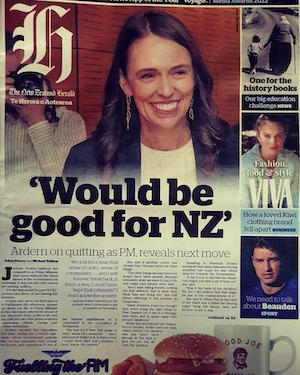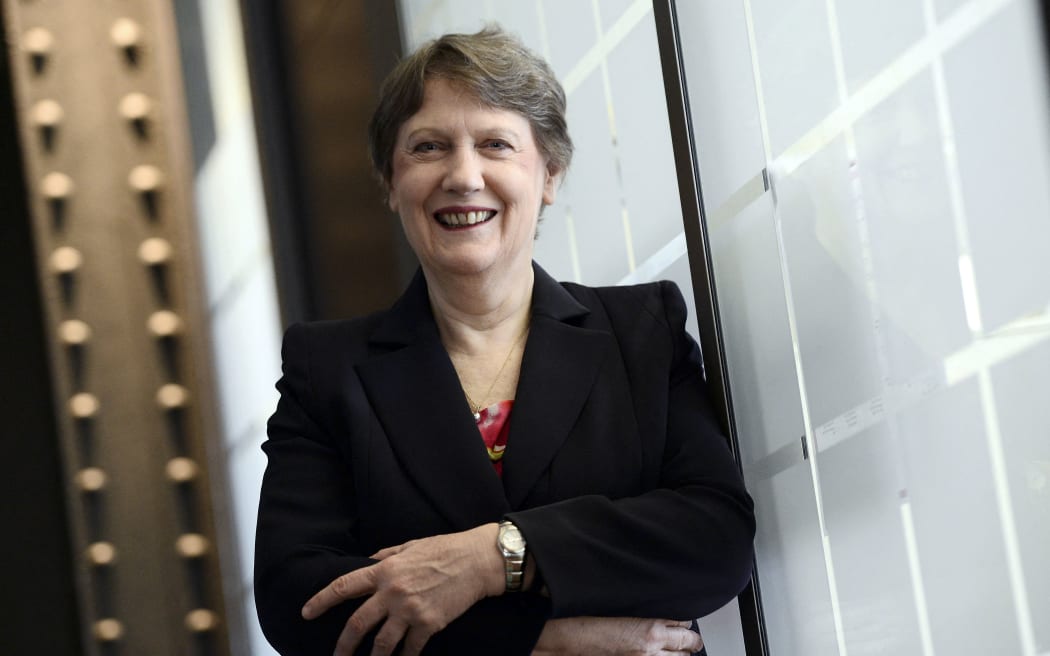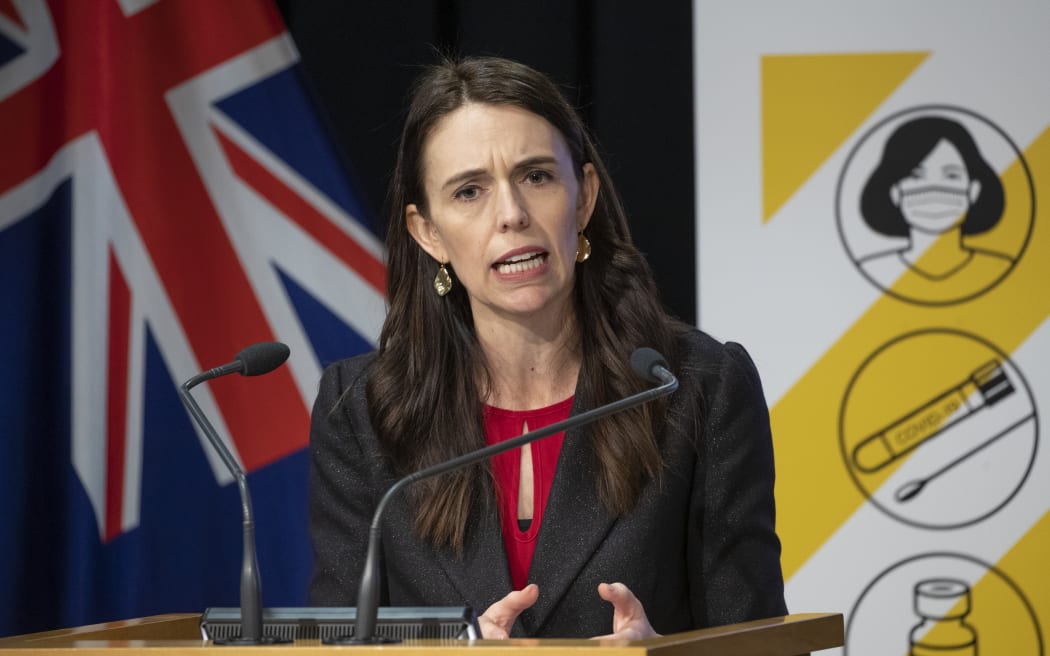Jacinda Ardern will largely be remembered in Aotearoa New Zealand as the prime minister whose pandemic-era policies saved thousands of Kiwi lives, according to former prime minister Helen Clark.
And she will also be considered an example of how to govern in the age of social media and endless crises, political experts say, while also achieving more than her critics might give her credit for.
Ardern was set to deliver her valedictory speech later today, having stepped down as prime minister earlier this year after just over five years in the job.
“I think that while I’m happy for Jacinda that she’s going to get a life and design what she wants to do and when she wants to do it, you can’t help feeling sad about her going,” Clark, herself a former Labour prime minister, told RNZ Morning Report ahead of Ardern’s speech.
“Leaders like Jacinda don’t come along too often and we’ve lost one.”
Ardern has played down suggestions online vitriol played a part in her decision to stand aside — but acknowledged on Tuesday she hoped her departure would “take a bit of heat out” of the conversation.
Clark said she “fundamentally” believed the hatred got to Ardern, powered by “populism and division” generated by former US President Donald Trump and his supporters.
‘Conspiracies took hold’
“Conspiracies took hold and suddenly you know, as the pandemic wore on here, I think the sort of relentless barrage from America — not, not just through Trump himself and the reporting of him, but through the social media networks — we have the anti-science people, the people who completely distrusted public authority, the QAnon conspiracies and hey, it played out on our Parliament’s front lawn and it still plays out and it’s very, very vitriolic and divisive.
“So I think that that spillover impact was really quite, well, not just unpleasant — it was horrible.”

Researchers have found Ardern was a lightning rod for online hate.
The perpetrator of the 2019 mosque shootings used the internet to connect with and learn from other extremists, which led to Ardern setting up the Christchurch Call movement to eliminate terrorist and violent extremist content online.
Her post-parliamentary career will include continuing that work, as New Zealand’s Special Envoy for the Christchurch Call, reporting to her replacement, Prime Minister Chris Hipkins.
“The mosque murders was just the most horrible thing to have happen on anyone’s watch, and she rose to the occasion, and I think the international reputation was very much associated with initially the empathy that she showed at that time,” said Clark.
But “one of New Zealand’s darkest days”, as Ardern put it at the time, was not the only near-unparalleled crisis she had to deal with in her time as prime minister.
“The White Island tragedy was another that needed, you know, very empathetic and careful handling. But then comes covid, and there’s no doubt that thousands of people are alive today because of the steps taken, particularly in 2020.
‘Would we have survived?’
“You know, I mean, I’m obviously in the older age group now which is more vulnerable. My father is 101 now and has survived the pandemic. But would we have survived it if it had been allowed to rip through our community, like it was allowed to rip through others?
“I think that there’d be so many New Zealanders not alive today had those steps not been taken.”
Data shows New Zealand has actually experienced negative excess mortality over the past few years — the elimination strategy so successful, fewer Kiwis have died than would have if there was no pandemic.
Former Director-General of Health Dr Ashley Bloomfield said that was “unique, virtually unique around the world”.
Despite that, it was New Zealand’s aggressive approach towards covid-19 in 2020 and 2021 that arguably drove much of the polarisation and online vitriol.
“There’s no doubt that those measures did save lives. They also drove people into frenzied levels of opposition and fear and isolation,” said Clark. “They felt polarised, they felt locked out.”
But she said Ardern bore “very little” responsibility for that.

Political scientist Dr Bronwyn Hayward of the University of Canterbury said Ardern’s Christchurch Call to eliminate extremist content will have a long-lasting impact on not just New Zealand, but the world.
“There’s been a lot made about the fact that she resigned under pressure from the trolls, which is completely missing the point that what she’s saying is that in this era where we’ve got particularly Russian, but also other countries’ bots that are attacking liberal leaders,” Dr Hayward told Morning Report, saying Ardern was the first global leader to “really understand” how what happens online can spill over into the real world.
“She understands that democracies are now under attack, and the front line is your social media, where we’ve got a propaganda war coming internationally.
“So she’s taken a very systemic approach to thinking about how to tackle that, so that in local communities it feels like you’re reeling from Islamophobia, to racism to transphobia, but actually, when we look internationally at what’s happening, naive and quite disaffected groups have been constantly fed this material and she’s taken a systemic approach to it.”
Clark said one of the biggest differences in the world between Ardern’s time as prime minister and her own, was that she did not have to deal with social media.
“I didn’t have a Twitter account, didn’t know what it was really. We had texts, that was about it. We used to have pagers, for heaven’s sake.”
Ardern’s domestic legacy
One of the first things Hipkins did when he took over as prime minister was the “policy bonfire” — but critics have long said the Ardern-led government has had trouble delivering on its promises.
Interviewer Guyon Espiner reminded Clark that her government had brought in long-lasting changes like Working for Families, the NZ Super Fund and Kiwibank — asking her what Ardern could point to.
Clark defended Ardern, saying the coalition arrangement with NZ First in Ardern’s first term slowed any reform agenda she might have had, and then there was covid-19.
“Looking back, there needs to be more recognition that the pandemic blindsided governments, communities, publics around the world. It wasn’t easy.”
Dr Hayward pointed to the ban on new oil and gas exploration and child poverty monitoring, “which before that was ruled as impossible or too difficult”.
Dr Lara Greaves, a political scientist at the University of Auckland, said it was “incredibly hard to really evaluate” Ardern’s legacy outside of covid-19.
“Ultimately … she is the covid-19 prime minister.”

The future
Clark said Ardern would be emotional during her valedictory speech.
“You have very close relationships with colleagues, you have relationships with others of a different kind — with the opposition, with the media, with the public — and you’re walking away, you’re closing the door on it.
“But you know that a new chapter will open, and that life post-politics can be very rewarding. I’ve certainly found it so. I have no doubt that Jacinda will get back into her stride with doing things that she feels are worthwhile for the the general public and worthwhile for her.”
After losing the 2008 election, Clark rose the ranks at the United Nations. She said while that was an option for Ardern, there is plenty of time for the 42-year-old to do other things first.
“I was, you know, 58 when I left being prime minister. And Jacinda’s leaving in her early 40s and she has a young child, so who knows? She may want Neve to grow up with a good old Kiwi upbringing.
“And she may want her, you know, involvement internationally to be more, you know, forays out from New Zealand. That’s for her to decide. I mean, the world’s her oyster, if she chooses to follow that.”
Dr Greaves also pointed to Ardern’s relative youth.
“It seems like she’s going for a period of sort of recovery and reflection and figuring out what to do next. But of course, she’s got another 20 years in her career, at least — the world’s her oyster.”
This article is republished under a community partnership agreement with RNZ.
As Jacinda Ardern gets ready to deliver her valedictory speech in the Parliament today, former prime minister Helen Clark says she will largely be remembered as the prime minister whose pandemic-era policies saved thousands of Kiwis’ lives. https://t.co/LhKPSZulpW
— RNZ (@radionz) April 5, 2023
Article by AsiaPacificReport.nz





